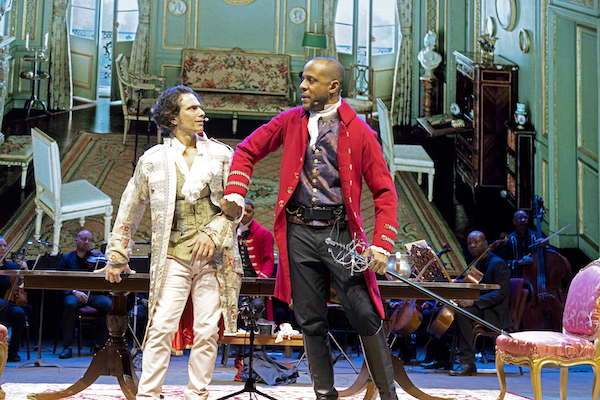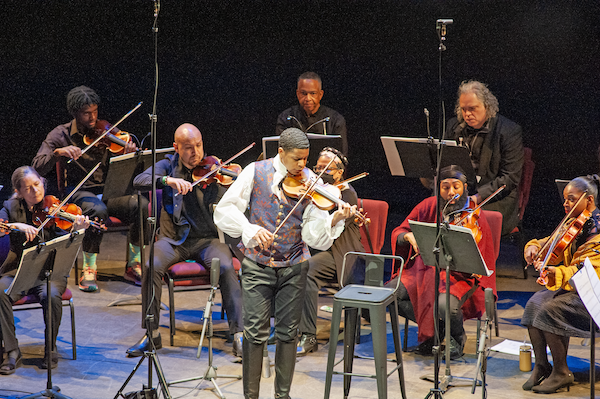“The Chevalier” paints full-length portrait of Bologne in theater and music

Extraordinary times breed extraordinary lives. Some of these blaze in the public eye for a time, only to be forgotten by later generations—until another extraordinary time brings them back into view.
Historians of classical music, the sport of fencing, and the French Revolution have known all along about Joseph Bologne, Chevalier de Saint-Georges, the jaw-droppingly accomplished son of a white planter and an enslaved woman in Guadeloupe, who became the toast of pre-revolutionary Paris for his prowess with a sword and a violin bow. Friend and tutor to Queen Marie Antoinette, Bologne survived imprisonment during the revolution to lead France’s first black military unit and champion the abolition of slavery.
Now, in an era when race relations and aspirations are much in mind, the rest of us are catching up with this remarkable person. His life sounds like the stuff of movies, and it became exactly that in 2022 with the release of the film Chevalier.
It is also the stuff of outreach from the seemingly insular classical music world to a wider community, a notable instance of which occurred Sunday afternoon at the United Palace, the landmark 1930 movie house in Washington Heights, with a lively performance of Bill Barclay’s concert-play The Chevalier by actors, musical soloists and the Harlem Chamber Players.
A large and diverse audience took in the spectacle, directed by Barclay under the auspices of Music Before 1800, in which a dozen or so substantial excerpts of Bologne’s appealing compositions alternated with scenes from his life.
Seated upstage from the actors, the 16-player Harlem ensemble gave Bologne’s music a presence that one doesn’t get from hearing it on the radio or in a movie. Hearing their stylish performances of symphonies, concertos, a violin sonata and a symphonie concertante, one realized that the often-heard expression “the black Mozart” wasn’t just a glib (and possibly demeaning) catchphrase. In its warmth, grace and wit, the Chevalier’s music had much in common with that of the Salzburg master.
For all their other virtues, Mozart’s violin concertos never scaled the virtuoso heights Bologne reached with the then-new Tourte bows, famed then and now for their power and agility. The Chevalier’s concertos boil over with batteries and bariolages, brilliantly executed on Sunday by violinist Brendon Elliott, who split the role of Bologne with actor RJ Foster. Elliott’s sweet, mournful rendering of the Adagio from Bologne’s Concerto in D major, Op. 3, no. 1, set the scene admirably for Mozart’s grief at the loss of his mother when both were visiting Paris in 1778.

Yes, Mozart was a character in The Chevalier, thanks to the coincidence of his and Bologne’s living in the same house for a month or so following the death of mother Mozart. As written and directed by Barclay, David Joseph played the young Salzburger in full-out, antic Amadeus mode, drowning his grief in wine and throwing up on his violinist housemate, played by Foster with regal dignity. He also engaged Bologne in spirited debate about the solid virtues and intellectual depth of Austrian music compared to the “frivolous” and “superficial” French. (Mozart expressed such opinions in his letters, but no historical record exists of his conversations, if any, with Bologne.)
Actress Merritt Janson, warm and quick-witted as Marie Antoinette, couldn’t be blamed for the anachronistic tone of her scenes with Bologne. The naturalistic dialogue and incessant crisscross blocking of Barclay’s conception would have suited a play by Chekhov or O’Neill better than a scene between an 18th-century monarch and her subject. (When she told Bologne she was powerless to ban slavery in the colonies, he bellowed, “You’re the Queen of France!”) Her scenes did shed light on how court and artistic intrigues–and outright racism—frustrated her and others’ efforts to advance Bologne’s career by obtaining him such posts as director of the Paris Opera.
Just one more historical character populated the stage: Pierre Choderlos de Laclos, an artillery officer mainly famous for the scandalous novel he wrote in his spare time, Les Liaisons dangereuses. As grandly and self-importantly played by Barclay himself, Laclos entered the story as the librettist for Bologne’s first opera Ernestine, which failed despite the Queen’s attending it. (The composer had better success later with L’Amant anonyme, music from which was heard between scenes Sunday.)
Barclay/Laclos was also useful as a genial storyteller, filling gaps in the play’s narrative, handing out facts and statistics about the Chevalier, and tracing the musician’s post-revolutionary career in the play‘s epilogue.
Pianist Jas Ogiste of the Harlem ensemble ably accompanied Elliott in Bologne’s violin sonatas and set a reflective tone for the epilogue with a moody solo, the composer’s Adagio in F minor.
Ashley Horne stepped up from his first-violin chair in the Harlem group to match Elliott leap-for-leap and scale-for-scale in Bologne’s brilliant Symphonie concertante in G major, Op. 13.
Produced through Concert Theatre Works, Bill Barclay’s non-profit organization to build classical audiences through barrier-breaking theatrical presentations, The Chevalier has received over a dozen productions in the U.S. and the U.K., often (as on Sunday) with a generous supply of free tickets.
Attendees get not only person-to-person experience of classical music and the human stories associated with it, but plenty of face time with classical’s unique way of identifying music by genre, key, and opus number, not just in the printed program but projected in large type onstage when the music is playing. One hopes that touch of familiarity will help demystify yet another curious classical custom.
Music Before 1800 presents The Marian Consort performing Portuguese motets by Vicente Lusitano, thought to be the first published composer of African heritage, 4 p.m. Feb. 11 at Corpus Christi Church, Morningside Heights. mb1800.org.
Posted Jun 14, 2024 at 11:20 am by Elizabeth Pomeroy
This reviewer makes the music and the context so fascinating- we can’t wait to discover, or rediscover, the Chevalier now. Applause for the perceptions we always enjoy from David Wright.